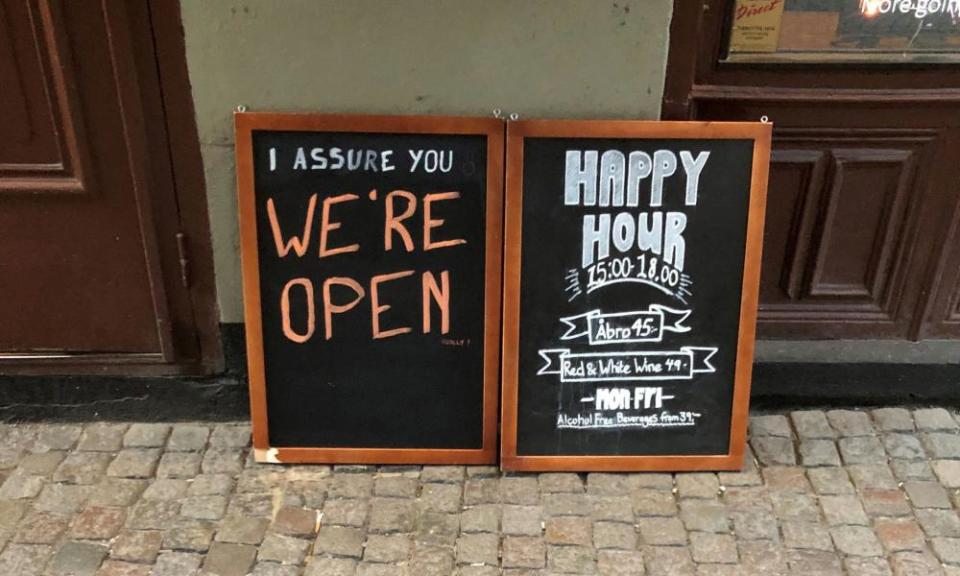As the rest of Europe lives under lockdown, Sweden keeps calm and carries on

If there’s been a fall in custom at the Nyhavn restaurant, it’s hardly noticeable. Groups of drinkers huddle under heat lamps out on Möllevång Square, the centre of nightlife in the Swedish city of Malmö, seemingly oblivious to the virus spreading through Europe.
“It’s the Swedish trust in government,” says Elias Billman, 22. “No one told me you have to stay home right now,” agrees his friend, Fredrik Glückman, a history student at Lund University. “We’re not in quarantine. And as soon as we hear from our government that we have to stay in, like you do in Britain, then we will do it.”
“But not,” Billman adds, “if Boris Johnson says it.”
While every other country in Europe has been ordered into ever more stringent coronavirus lockdown, Sweden has remained the exception. Schools, kindergartens, bars, restaurants, ski resorts, sports clubs, hairdressers: all remain open, weeks after everything closed down in next door Denmark and Norway.
Universities have been closed, and on Friday, the government tightened the ban on events to limit them to no more than 50 people. But if you develop symptoms, you can still go back to work or school just two days after you feel better. If a parent starts showing symptoms, they’re allowed to continue to send their children to school.
It has only been in the past couple of days that the death toll has started to increase significantly, rising by a third in a single day on Thursday and Friday, with 92 people now dead and 209 in intensive care. As he announced the tighter restrictions on Friday, the prime minister, Stefan Löfven, warned that the coming weeks and months would be tough.
How many lives are they willing to sacrifice so as not to lockdown and risk greater effects on the economy?
Joacim Rocklöv, professor of epidemiology, Umeå University
But he defended the decision not to implement the tighter restrictions seen in Denmark, France and the UK. “We all, as individuals, have to take responsibility. We can’t legislate and ban everything,” he said. “It is also a question of commonsense behaviour.”
Anders Tegnell, Sweden’s state epidemiologist, believes it is counterproductive to bring in the tightest restrictions at too early a stage. “As long as the Swedish epidemic development stays at this level,” he tells the Observer, “I don’t see any big reason to take measures that you can only keep up for a very limited amount of time.”
His team at the Public Health Agency of Sweden is critical of the Imperial College paper that warned this month that 250,000 people in the UK would die if the government failed to introduce more draconian measures. A week later Johnson ordered the police to implement a partial lockdown to combat the virus, telling people they “must stay at home”.
“We have had a fair amount of people looking at it and they are sceptical,” says Tegnell. “They think Imperial chose a number of variables that gave a prognosis that was quite pessimistic, and that you could just as easily have chosen other variables that gave you another outcome. It’s not a peer-reviewed paper. It might be right, but it might also be terribly wrong. In Sweden, we are a bit surprised that it’s had such an impact.”
The best explanation for why Sweden is such an outlier centres on the unusual level of independence given to government agencies such as Tegnell’s, and the reluctance of politicians to override them.
“I feel that the Swedish government is handling this very reasonably,” argues Erika Lindquist, who is drinking with her brother and Danish husband at another table at the Nyhavn. “They’re listening to the health department; they’re listening to the experts they have on hand.”
There is criticism, however. More than 2,000 Swedish university researchers published a joint letter on Wednesday questioning the Public Health Agency’s position, while the previous week saw leading epidemiologists attack the agency in emails leaked to Swedish television.

“How many lives are they willing to sacrifice so as not to lockdown and risk greater effects on the economy?” asked one, Joacim Rocklöv, a professor of epidemiology at Umeå University.
Tegnell argues that because in Sweden there are almost no stay-at-home parents, closing schools would have knocked out at least a quarter of doctors and nurses, crippling the health service. By pushing children out into society, it might even have increased the threat to the elderly, particularly if they were called upon to babysit.
He points out that Sweden has almost no households where the over-70s live with younger adults and children.
Tegnell even questions whether stopping the progress of the virus is desirable. “We are just trying to slow it, because this disease will never go away. If you manage, like South Korea, to get rid of it, even they say that they count on it coming back. Stopping it might even be negative, because you would have a pent-up possible spread of the disease, and then once you open the gates, there is a possibility that there would be an even worse outcome.”
While Tegnell understands that he will be blamed if Sweden ends up in a similar situation to that of Italy, he refuses to be panicked. “I wouldn’t be too surprised if it ended up about the same way for all of us, irrespective of what we’re doing,” he says. “I’m not so sure that what we’re doing is affecting the spread very much. But we will see.”


